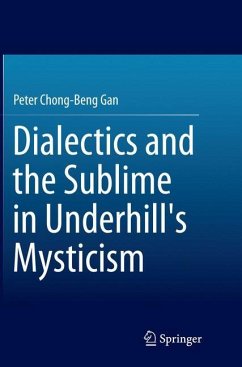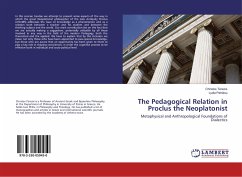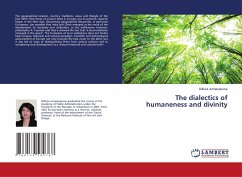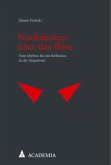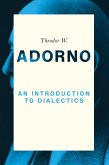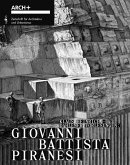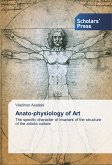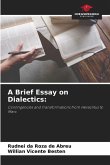Peter Chong-Beng Gan
Dialectics and the Sublime in Underhill's Mysticism
Peter Chong-Beng Gan
Dialectics and the Sublime in Underhill's Mysticism
- Broschiertes Buch
- Merkliste
- Auf die Merkliste
- Bewerten Bewerten
- Teilen
- Produkt teilen
- Produkterinnerung
- Produkterinnerung
This book represents a study of Evelyn Underhill's premier work on mysticism, using Hegel's dialectics and Kant's theory of the sublime as interpretive tools. It especially focuses on two prominent features of Underhill's text: the description of the mystical life as one permeated by an intense love between the mystic and infinite reality, and the detailed delineation of stages of mystical development. Given these two features, the text lends itself to a construction of a valuable discourse predicated on dialecticism, sublimity, and mysticism. The book also articulates a number of insights…mehr
Andere Kunden interessierten sich auch für
![The Pedagogical Relation in Proclus the Neoplatonist The Pedagogical Relation in Proclus the Neoplatonist]() Christos TerezisThe Pedagogical Relation in Proclus the Neoplatonist16,99 €
Christos TerezisThe Pedagogical Relation in Proclus the Neoplatonist16,99 €![The dialectics of humaneness and divinity The dialectics of humaneness and divinity]() Dilfuza JumanyazovaThe dialectics of humaneness and divinity23,99 €
Dilfuza JumanyazovaThe dialectics of humaneness and divinity23,99 €![Nachdenken über das Böse Nachdenken über das Böse]() Hanns FrericksNachdenken über das Böse69,00 €
Hanns FrericksNachdenken über das Böse69,00 €![An Introduction to Dialectics An Introduction to Dialectics]() Theodor W. AdornoAn Introduction to Dialectics24,99 €
Theodor W. AdornoAn Introduction to Dialectics24,99 €![Giovanni Battista Piranesi Giovanni Battista Piranesi]() Klaus HeinrichGiovanni Battista Piranesi28,00 €
Klaus HeinrichGiovanni Battista Piranesi28,00 €![Anato-physiology of Art Anato-physiology of Art]() Vladimer AsatianiAnato-physiology of Art39,99 €
Vladimer AsatianiAnato-physiology of Art39,99 €![A Brief Essay on Dialectics: A Brief Essay on Dialectics:]() Rudnei da Roza de AbreuA Brief Essay on Dialectics:26,99 €
Rudnei da Roza de AbreuA Brief Essay on Dialectics:26,99 €-
-
-
This book represents a study of Evelyn Underhill's premier work on mysticism, using Hegel's dialectics and Kant's theory of the sublime as interpretive tools. It especially focuses on two prominent features of Underhill's text: the description of the mystical life as one permeated by an intense love between the mystic and infinite reality, and the detailed delineation of stages of mystical development. Given these two features, the text lends itself to a construction of a valuable discourse predicated on dialecticism, sublimity, and mysticism. The book also articulates a number of insights into the content and nature of the writings of Christian mystics.
Produktdetails
- Produktdetails
- Verlag: Springer / Springer Nature Singapore / Springer, Berlin
- Artikelnr. des Verlages: 978-981-10-1270-9
- Softcover reprint of the original 1st ed. 2015
- Seitenzahl: 256
- Erscheinungstermin: 23. Oktober 2016
- Englisch
- Abmessung: 235mm x 155mm x 15mm
- Gewicht: 397g
- ISBN-13: 9789811012709
- ISBN-10: 9811012709
- Artikelnr.: 46886837
- Verlag: Springer / Springer Nature Singapore / Springer, Berlin
- Artikelnr. des Verlages: 978-981-10-1270-9
- Softcover reprint of the original 1st ed. 2015
- Seitenzahl: 256
- Erscheinungstermin: 23. Oktober 2016
- Englisch
- Abmessung: 235mm x 155mm x 15mm
- Gewicht: 397g
- ISBN-13: 9789811012709
- ISBN-10: 9811012709
- Artikelnr.: 46886837
Peter Gan is an academic in the Philosophy and Civilization Section of the School of Humanities at Universiti Sains Malaysia, Penang. In the midst of spending years juggling work and studies he managed to complete a Bachelor of Theology, a Bachelor of Arts (honours), a Master of Social Science and a Doctoral Degree. Peter's research, publication, and teaching revolve around the discipline of philosophy. To the best of his recollection, his interest in mysticism was first piqued when he just completed high school. For more than a decade now, Peter has been devoting a considerable degree of his energies to the study and investigation of mysticism using the categories and methods contained in the field of philosophy of religion.
Preface and Acknowledgements.- Chapter 1: Introduction.- 1.1: Evelyn Underhill and her foundational text on mysticism.- 1.2: Mysticism: concept, approaches, and the thrust of this study.- 1.3: Writings on and by Underhill.- 1.4: Procedure.- 1.5: The chapters.- 1.6: A note on gender pronouns.- Chapter 2: Being-Becoming.- 2.1: Introduction.- 2.2: Vitalism: transcendence in this world of flux.- 2.3: A general configuration of being, becoming, and infinite being.- 2.4: Being and becoming and the mediating dialectic.- 2.5: Being and becoming and the individualizing dialectic.- 2.6: Transcendence and immanence, and the being-becoming dialectics.- 2.7: Sublimity and the two forms of mystical transcendence.- 2.7.1: The sublime in transcendence as including-exceeding.- 2.7.1.1: Experiencing divine reality as infinite.- 2.7.1.2: Experiencing all finite beings as immersed in infinite reality.- 2.7.2: The sublime in transcendence as excluding.- 2.8: Chapter conclusion.- Chapter 3: Infinity-Finitude.- 3.1: Introduction.- 3.2: Talking about infinity.- 3.2.1: Potential and actual infinities: establishing the contention.- 3.2.2: A synthesis of potential and actual infinities.- 3.3: Dialectical trinity.- 3.3.1: Configuring the relational structure of the trinity.- 3.3.2: Hegel's infinity and trinity.- 3.4: The problem of objectivity in mystical intimacy.- 3.4.1: Trans subjectivism and mysticism.- 3.4.2: Objective idealism and mysticism.- 3.4.3: Tentative unitivism and mysticism.- 3.5: Chapter conclusion.- 4: Light-Darkness (I).- 4.1: Introduction.- 4.2: A dialectical metaphor.- 4.2.1: Dialectical pairing.- 4.2.2: Dialectical procedure as negation of negation.- 4.3: Mysticism's stage development: an overview.- 4.4: The dawn of the mystical quest.- 4.4.1: Testimonials on awakening.- 4.4.2: Sublime awakening.- 4.5: The first transformative night.- 4.5.1: Detachment.- 4.5.2: Mortification.- 4.5.3: Dialectical incorporation, universal-particular dialectic, and sublimity.- 4.6: Illumination.- 4.7: Chapter conclusion.- Chapter 5: Light-Darkness (II).- 5.1: Introduction.- 5.2: The second transformative night.- 5.2.1: Dark night and depression.- 5.2.2: Sublimity and the negation of negation.- 5.2.3: Darkness as emptiness.- 5.2.4: Oscillation and co-existence of light and darkness.- 5.2.5: Purification of sense and spirit.- 5.2.6: Mystical death.- 5.3: The Unitive Life.- 5.3.1: Experience of mystical union and the issue of the content of consciousness.- 5.3.2: Union experience versus identity experience.- 5.3.3: The enduring unitive life.- 5.4: Chapter conclusion.- Chapter 6: Conclusion.- 6.1: Sublime beauty and beautiful sublime.- 6.2: Overall summing-up and suggestions for future researches.- References.- Index.
Preface and Acknowledgements.- Chapter 1: Introduction.- 1.1: Evelyn Underhill and her foundational text on mysticism.- 1.2: Mysticism: concept, approaches, and the thrust of this study.- 1.3: Writings on and by Underhill.- 1.4: Procedure.- 1.5: The chapters.- 1.6: A note on gender pronouns.- Chapter 2: Being-Becoming.- 2.1: Introduction.- 2.2: Vitalism: transcendence in this world of flux.- 2.3: A general configuration of being, becoming, and infinite being.- 2.4: Being and becoming and the mediating dialectic.- 2.5: Being and becoming and the individualizing dialectic.- 2.6: Transcendence and immanence, and the being-becoming dialectics.- 2.7: Sublimity and the two forms of mystical transcendence.- 2.7.1: The sublime in transcendence as including-exceeding.- 2.7.1.1: Experiencing divine reality as infinite.- 2.7.1.2: Experiencing all finite beings as immersed in infinite reality.- 2.7.2: The sublime in transcendence as excluding.- 2.8: Chapter conclusion.- Chapter 3: Infinity-Finitude.- 3.1: Introduction.- 3.2: Talking about infinity.- 3.2.1: Potential and actual infinities: establishing the contention.- 3.2.2: A synthesis of potential and actual infinities.- 3.3: Dialectical trinity.- 3.3.1: Configuring the relational structure of the trinity.- 3.3.2: Hegel's infinity and trinity.- 3.4: The problem of objectivity in mystical intimacy.- 3.4.1: Trans subjectivism and mysticism.- 3.4.2: Objective idealism and mysticism.- 3.4.3: Tentative unitivism and mysticism.- 3.5: Chapter conclusion.- 4: Light-Darkness (I).- 4.1: Introduction.- 4.2: A dialectical metaphor.- 4.2.1: Dialectical pairing.- 4.2.2: Dialectical procedure as negation of negation.- 4.3: Mysticism's stage development: an overview.- 4.4: The dawn of the mystical quest.- 4.4.1: Testimonials on awakening.- 4.4.2: Sublime awakening.- 4.5: The first transformative night.- 4.5.1: Detachment.- 4.5.2: Mortification.- 4.5.3: Dialectical incorporation, universal-particular dialectic, and sublimity.- 4.6: Illumination.- 4.7: Chapter conclusion.- Chapter 5: Light-Darkness (II).- 5.1: Introduction.- 5.2: The second transformative night.- 5.2.1: Dark night and depression.- 5.2.2: Sublimity and the negation of negation.- 5.2.3: Darkness as emptiness.- 5.2.4: Oscillation and co-existence of light and darkness.- 5.2.5: Purification of sense and spirit.- 5.2.6: Mystical death.- 5.3: The Unitive Life.- 5.3.1: Experience of mystical union and the issue of the content of consciousness.- 5.3.2: Union experience versus identity experience.- 5.3.3: The enduring unitive life.- 5.4: Chapter conclusion.- Chapter 6: Conclusion.- 6.1: Sublime beauty and beautiful sublime.- 6.2: Overall summing-up and suggestions for future researches.- References.- Index.

